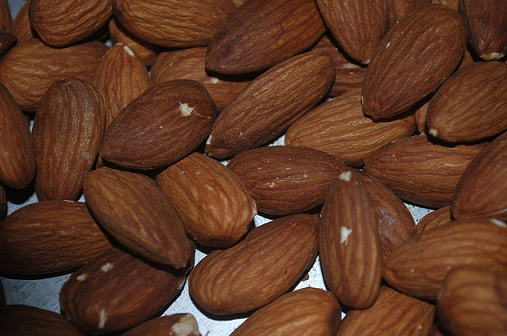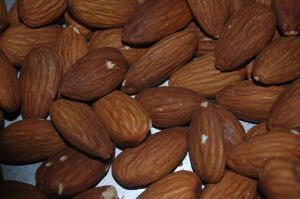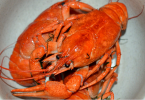Today’s question: can dogs eat almonds? Are almonds bad or good for dogs? Scroll down for detailed answers.
We all know dogs love eating weird stuff. Whether because they are curious or they just do not know any better, dogs are among the animals that will smell, sniff, lick, chew and swallow just about anything they lay their paws on. They tend to willingly eat most of the things fed to them. However, that does not mean dogs should be eating everything that is given to them. Believe it or not, some of the foods that are completely safe for us to eat can be extremely toxic for your pet (take chocolate, for example). So, you want to keep an eye on that.
Dogs are especially known for eating foods within the nut family. Many dogs love peanut butter and dog owners use peanut butter as a treat in many ways. Wrapping peanut butter on a bone, or putting medicine in peanut butter are the better known ways of dogs enjoying this type of food. Dogs may be known to enjoy peanuts, but what about almonds? Almonds are a part of the nut family. Almonds are relatively small in size, a low choking hazard, and have beneficial vitamins and nutrients that humans enjoy the benefit of. Are dogs able to enjoy these little nuts as their human caregivers do? Do dogs benefit from the healthy fast of almonds?
Can dogs eat almonds? They are healthy and recommended for humans, but are they as beneficial to dogs as well? Are almonds toxic to dogs? Let’s find out.
How Come Dogs Can Eat so Many Types of Foods?
Unlike cats, for example, who are obligate carnivores (which means they need meat protein in order to survive and thrive), dogs are more like humans and can be considered omnivores. What this means is that dogs are free to eat fruits, vegetables, nuts, grains, and other kinds of foods, and that will not damage their health in any way. In fact, they can get healthy and necessary nutrients from all these different and diverse meals. While a dog may be considered an omnivore, dogs are truly carnivores, evolving in the wild to be meat eaters. Dogs require certain amounts of protein in their diet that derive from meat sources. Dogs should not eat only people food, or only fruits and veggies, no matter how strict of a diet you yourself are on.
Dogs are similar to human in the types of food their system is able to digest and utilize to better their body and their health. Dogs are able to digest most all foods, with the exception of those containing toxins, such as chocolate, garlic, and onions. Seeds, pits, and cores of fruits also need to be avoided in a dog’s diet, but most food is fair game.
The thing to pay attention to, however, is the fact that your dog should not survive on alternate meals unless specifically instructed by its vet. Dogs still need their meat protein, so do not make him a vegetarian or vegan, just because you are one. However, if your pooch seems to be longing for a piece of your lunch, you can definitely indulge it and serve your pup a tiny bit, as long as you check that the type of food is okay for dogs to ingest beforehand. Always look into which foods are able to ingested and digest safely. You do not want to feed your dog food only to find out later that your dog is allergic to the food or is unable to digest the ingredients.
Foods & Toxicity
The need for researching the human food you intend to offer your dog comes from the fact that a lot of foods that are otherwise completely harmless to humans can be toxic, harmful, and even deadly to animals. Dogs are meant to eat meat, not almonds and other types of foods offered by humans. Dogs do not have the all of the digestive capabilities human do in breaking down food, therefore, foods that do not break down may cause toxic buildups, poisonings, and blockages in the intestine.
Surely you know about chocolate, but grapes are also a culprit when it comes to dogs. The scientific reason has not been discovered yet, but dogs have extreme reactions to grapes of any type or color, as well as raisins. Liver failure, coma and finally, death are all things that your dog may experience, so make sure to keep grapes and raisins safely outside of reach. Many dog owners would not think twice offering a grape or a raisin because the food is a whole food and deemed nutritious by human standards. With a little research beforehand, you would learn the potential toxicity of this food, as well as other foods you intend to offer your dog on occasion. Knowing in advance the foods that ae acceptable may save your dog’s life, save you countless hours of worry and care, and save thousands of dollars in vet bills.
Can Dogs Eat Almonds?
While almonds are not toxic for dogs, it is generally not recommended to give them to your pet. Due to the fact of almond being so small, and the fact that dogs do not chew their food and count their bites to ensure the food offered is broken down before swallowing, an almond may end up being swallowed as a whole piece. Almonds being swallowed whole can lead to a myriad of health issues for your dog. An almond may become lodged in the throat of your dog, especially a small dog or a toy breed who has a smaller than average neck. An almond may also lead to an intestinal blockage which can lead to death. If you must offer your dog almonds, be sure to help your dog in the breaking up process of the nut. Slice the almond, chop the almond, or even grind the almond into a paste and offer to your dog in this manner. Breaking the almond down into bits will ensure your dog does not choke or have his/her digestive system interrupted.
Generally, many nuts are very toxic for dogs, and they should be avoided. Almonds will not cause quite the same strong reaction as other types of nuts, but that does not mean almonds are really what you would call safe either. Almonds derive from the nut family and have a similar nutrient makeup as other nuts. There may be an aspect of the almond that does not agree with your dog and s/he will have serious stomach upset. If your dog seems to have a stronger stomach than most, you may feel comfortable giving an almond a try. If your dog seems to tolerate the almond well, you may begin to offer slightly larger servings to your dog. Only offer food to your dog in small bits at first, to ensure the dog is able to tolerate the food. Moving forward, only slightly increase the serving size and only offer on occasion only.
The bottom line here is that while you could probably get away with feeding your dog a few almonds (and s/he may be begging for them), it is safer and smarter not to give in, for your pet’s sake. Better be safe than sorry. Besides the risk of allergic reaction, choking, and stomach problems, almonds have a high fat content. The high fat content can be beneficial in some ways, for example, shiny coat and healthy skin, but high fat content in excess will lead to potential weight gain, obesity, and cholesterol issues.
What About Other Kinds of Nuts?
Nuts are a dangerous category when it comes to canine’s consumption because many of them are toxic. Researching which nuts are safe your particular dog and his/her breed is incredibly important. With such a variety of nuts on the market, you should do your homework and deduce the correct nut to offer your friend. What makes offering nuts to your dog even more difficult is the fact that dogs tend to love the taste of nuts, and they will want some. However, nuts come in a lot of different shapes, sizes and categories, which all come with warnings, unfortunately. Obviously, when it comes to those which are toxic, such as black walnuts or pecans, for example, you have to keep your dog away from them at all cost.
In addition to these nuts that are deemed toxic, there are nuts that do not have toxic contents, but are very rich in fat. Just because a nut is deemed nontoxic does not mean the nut is beneficial to your dog. A nut with a high fat content is just as bad for your dog as a toxic nut. Eating nuts high in fat could be very harmful to your dog, as it can lead to an upset stomach and other gastro-digestive issues. Pistachios, Macadamia Nuts, Japanese Walnuts, English Walnuts and others are all culprits in this case. If you do love munching on nuts of any variety, make sure you do so away from your dog and remember to store them in an enclosed space, out of reach of your pet’s curious nose.
Conclusion
In conclusion, while almonds are not toxic, per se, it is best to avoid feeding them to your pooch. To put it simply, no variety of nuts is recommended for dogs, because while they may not be deadly, they can cause other issues. Almonds may become choking hazards and cause upset stomachs. Nuts are just not a very dog-friendly food, even though canines love them. You should better put them safely away somewhere on a top shelf, so your dog would not able to find them.
Related articles:
References:
https://www.aspca.org/about-us/faq/almonds
http://canigivemydog.com/almonds
http://www.dogster.com/dog-health-care/
http://www.msn.com/en-us/lifestyle/pets/nuts-that-are-unsafe-for-dogs-to-eat/ss-BBi1mNO#image=3









Leave a Comment